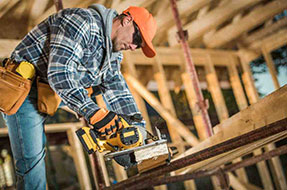Carpenter Apprenticeships

Carpenter Apprenticeship Programs
A carpenter apprenticeship is a structured training program that combines hands-on learning with classroom instruction to develop individuals into skilled carpenters. It provides aspiring carpenters with the opportunity to learn and master the tools, techniques, and skills necessary for a successful career in the carpentry trade.
During a carpenter apprenticeship, apprentices work under the guidance of experienced carpenters at construction sites, workshops, or renovation projects. They learn to read blueprints, take accurate measurements, and use various carpentry tools and equipment. Apprentices are involved in tasks such as cutting, shaping, and assembling building materials, as well as installing structures, fixtures, and finishes.
In addition to practical training, apprentices also receive theoretical instruction. They learn about construction principles, building codes and regulations, safety protocols, and project management. Classroom sessions may cover topics including math and measurements, blueprint reading, carpentry techniques, and workplace safety.
Carpenter apprenticeships typically have a set duration, often lasting three to four years. The structure and curriculum can vary depending on the regional regulations and the institution or organization offering the apprenticeship.
Apprenticeships offer several benefits, including:
Hands-on Experience: Apprentices gain valuable real-world experience working on actual construction projects, allowing them to develop their skills in a practical setting.
Mentorship: Apprentices work closely with experienced carpenters who provide guidance, feedback, and mentorship throughout the program.
Industry Exposure: Apprenticeships provide the opportunity to network and connect with professionals in the carpentry trade, opening doors to future employment opportunities.
Recognized Credentials: Upon completing an apprenticeship program, apprentices often receive industry-recognized certifications or qualifications, providing evidence of their skills and expertise.
Carpenter apprenticeships are a great way for individuals seeking a career in carpentry to receive comprehensive training, gain practical experience, and prepare for a successful and fulfilling career in construction and woodworking.
It's important to note that specific requirements, duration, and curriculum for carpenter apprenticeships may vary. Individuals interested in pursuing a carpenter apprenticeship should research and inquire about specific program details from reputable training institutions or construction industry organizations.
There are Different Types of Carpenters
There are different types of carpenters, each specializing in specific areas of woodworking and construction. There is some overlap between types, and some carpenters choose to be General Carpenters, that do all types of work. Here are some common types of carpenters:
Rough or Framing Carpenter: Rough carpenters primarily focus on the initial stages of construction, such as framing structures. Framers concentrate on building the framework or skeleton of a structure, including walls, floor systems, and roof systems. They are responsible for ensuring structural integrity and precise measurements.
Interior Systems or Acoustical Carpenter: Interior Systems Carpenters are skilled in the design and installation of partitions and fixtures in commercial buildings, including acoustical ceilings, computer access flooring, metal framing, wall partitions, and office furniture systems.
Finish or Trim Carpenter: Finish or trim carpenters specialize in the final touches of a construction project, including installing trim, molding, doors, and cabinets. They are skilled in precise measuring, cutting, and fitting of materials to achieve a polished look. Finish or Trim Carpenters focus on the installation of interior trim elements, such as baseboards, crown molding, window casings, and stair handrails.
Millwork or Cabinetmaker: Millworkers or Cabinetmakers specialize in the design, construction, and installation of various types of cabinets, including kitchen cabinets, bathroom vanities, and custom furniture pieces.
Ship or Marine Carpenter: Ship carpenters specialize in constructing, repairing, and maintaining wooden structures on ships and boats.
Formworker or Heavy Form Carpenter: Formworkers, also known as concrete carpenters, specialize in constructing formwork to support the building process during the pouring of concrete. They work on structures such as foundations, columns, highway bridges and beams.
These are some examples of the various types of carpenters, each with their own specific skill set and specialization. Individuals interested in pursuing a career as a carpenter can explore these different types to find the area that aligns with their interests.



